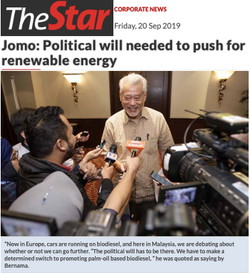- Oct 28, 2025
- 4 min read
KUALA LUMPUR, Malaysia, Oct 28 2025 (IPS) - Opposition to data centres (DCs) has been rapidly spreading internationally due to their fast-growing resource demands. DCs have been proliferating quickly, driven by the popularity of artificial intelligence (AI).
Who are data centres for?
Already, the AI boom has overwhelmed other ‘cloud’ uses and drives the rapid growth of DCs, imposing fast-expanding resource demands. This has triggered a bipartisan public backlash in the US due to higher energy, water, and land use, as well as rising prices.
In October 2024, McKinsey projected that global energy demand by DCs would rise between 19% and 22% annually through 2030, reaching an annual demand between 171 and 219 gigawatts.
This greatly exceeds the “current demand of 60 GW”. “To avoid a [supply] deficit, at least twice the [DC] capacity built since 2000 would have to be built in less than a quarter of the time”!
As tech companies are not paying for the additional energy generation capacity, consumers and host governments are, whether they benefit from AI or not.
As DCs increasingly faced growing pushback in the North, developers have turned to developing countries, outsourcing problems to poorer nations with limited resources.
Understanding these energy- and water-guzzling facilities is necessary to better protect economies, societies, communities, and their environments.
Energy needs
With growing corporate and consumer demand for AI, DC growth will continue, and even occasionally accelerate.
Increased AI usage will significantly increase energy and water consumption, accelerating planetary heating both directly and indirectly.
As demand for AI and DCs increases, supporting computers will require significantly more electricity. This will generate heat, needing the use of water and energy for cooling. Much energy used by DCs, from 38% to 50%, is for cooling.
Electricity generation, whether from fossil fuels or nuclear fission, requires more cooling than renewable energy sources such as photovoltaic solar panels or wind turbines.
A small-scale DC with 500 to 2,000 servers consumes one to five megawatts (MW). For tech giants, a ‘hyperscale’ DC, hosting tens of thousands of servers, consumes 20 to over 100MW, like a small city.
Data centres not cool
As the popular focus is on DCs’ enormous energy requirements, their massive water needs to cool equipment tend to be ignored, understated and overlooked.
Locating new DCs in developing countries will further heat local microclimates and the planetary atmosphere. Worse still, heat is more environmentally threatening in the tropics, where ambient temperatures are higher.
Establishing more DCs will inevitably crowd out existing and other possible uses of freshwater supplies, besides reducing local groundwater aquifers.
Unsurprisingly, DC investors rarely warn host governments about the amount of locally supplied energy and water required.
DCs require much freshwater to cool servers and routers. In 2023, Google alone used almost 23 billion litres to cool DCs. In cooling systems using evaporation, cold water is used to absorb severe heat, releasing steam into the atmosphere.
Closed-loop cooling systems absorb heat using piped-in water, while air-cooled chillers cool down hot water. Cooled water recirculated for cooling requires less water but more energy to chill hot water.
Investors expect subsidies
Like other prospective investors, DCs have relocated to areas where host governments have been more generous and less demanding.
Led by US President Trump’s powerful ‘tech bros’, many foreign investors have profited from subsidised energy, cheap land and water, and other special incentives.
Prospective host governments compete to offer tax and other incentives, such as subsidised energy and water, to attract foreign direct investment in DCs.
The US pressured Malaysia and Thailand to stop Chinese firms from using them as an “export-control backdoor” for its AI chips. Washington alleges that DCs outside China buy chips to train its AI for military purposes. So far, only Malaysia has complied.
This limits Chinese firms’ access to such chips. Washington claims that Chinese substitutes for US-made chips are inferior and seeks to protect US technology from China.
High-tech DC jobs?
Data centres are emerging everywhere, but not many jobs will be created. Advocates claim DCs will provide high-tech jobs.
DCs are largely self-operating, requiring minimal human intervention, except for maintenance, which they determine independently. Thus, job creation is minimised.
Construction and installation work will be temporary, with most managerial functions being performed remotely from headquarters. A Georgetown University report estimates only 27% of DC jobs are ‘technical’.
While the DC discourse mainly focuses on foreign investments, there is little discussion on growing national desires for data sovereignty.
Acceding to so many foreign requests will inevitably block national capacity ambitions to develop end-to-end DC capabilities and not just host them.
Thus far, there is limited interest in the ‘afterlife’ of DCs, such as what happens after they have outlived their purpose, or the disposal of waste materials.
Higher energy and water costs, subsidies, tax incentives and other problems caused by DCs are hardly offset by their modest employment and other benefits.
Related IPS Articles
Available online at: Data Centre Investments Bad Deals

















